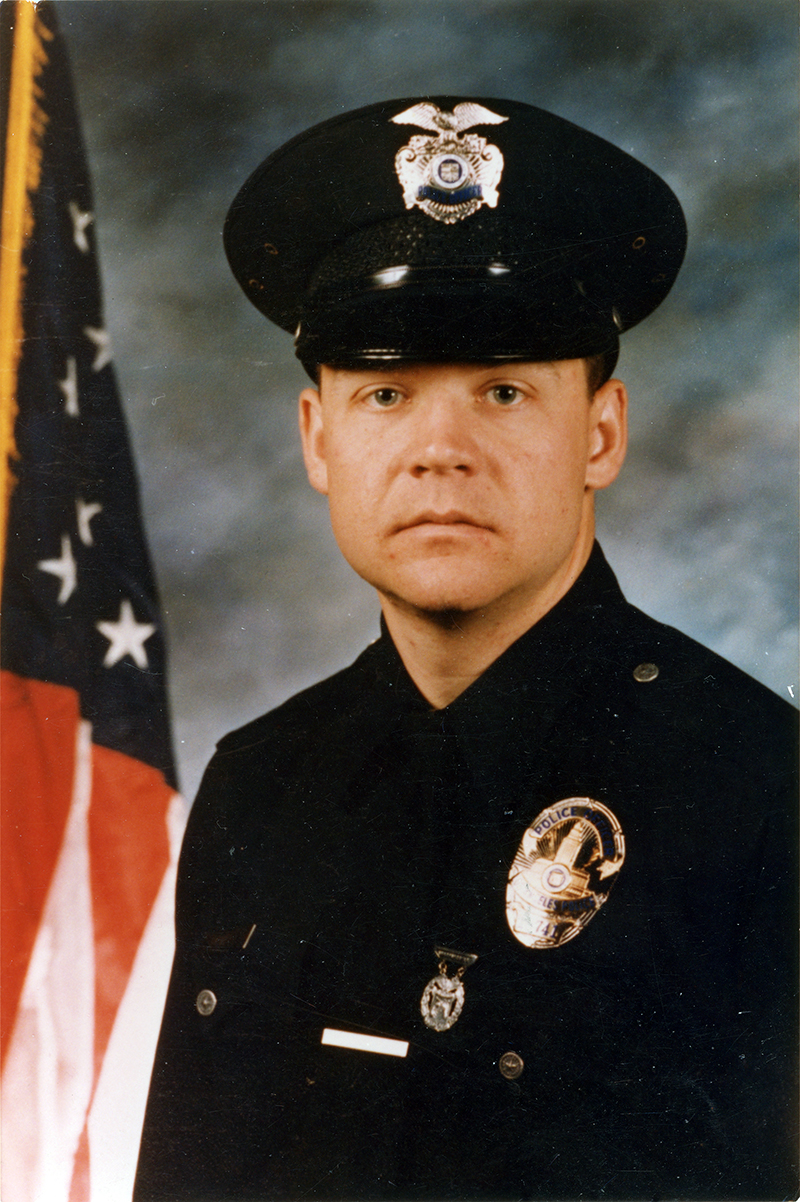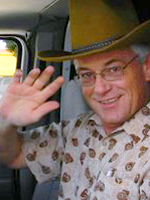Powell, Koon ruling breaks new ground
By Leon WordenWednesday, June 19, 1996
| W |
Last Thursday, the U.S. Supreme Court overturned the bulk of a lower court ruling that might have landed former Los Angeles Police Officer Laurence Powell and Sergeant Stacey Koon, both of the Santa Clarita Valley, back in prison after the two already completed their original sentences.

Office Laurence Powell, 1987. |
To recap, there was the state trial, where four LAPD officers were acquitted on most charges stemming from the 1991 Rodney King incident. Then there was the double-jeopardy federal retrial, which resulted in 30-month sentences for Powell and Koon. Then there was the appeal of those sentences by U.S. Attorney General Janet Reno's Justice Department on grounds that they were too light, and the resultant findings of a 9th circuit appellate panel that Judge John G. Davies had improperly departed from federal sentencing guidelines.
In setting aside the appellate findings, the high court said Davies was right in granting leniency because of King's actions to provoke the incident; the potential threat of bodily harm to the officers in prison; and the "specter of unfairness" that shrouded a process which subjected Powell and Koon to two trials for the same set of circumstances, with no new evidence.
I don't know Stacey Koon, but I know the Powell family was breathing a bit easier after last week's ruling. It isn't all over yet, but things look very good. The officers have my heartfelt congratulations and, as an American, my apologies for a system that can turn ordinary cops into a macabre movie-of-the-week, five years running.
But what will this Supreme Court action mean for other defendants in other trials? Court watchers have been paying close attention to this case, for these are uncharted waters.
The court's decision was unanimous. This is both rare and important. Liberal and conservative justices agreed for different reasons.
It didn't get much play in the press, but the American Trial Lawyers Association officially sided with Powell and Koon because a favorable ruling would set a precedent that could give judges greater discretion in granting leniency to real criminals.
On the other side of the fence, constitutionalists fared well, too.
In allowing the "unfairness" of two trials — one state, one federal — to be used as a mitigating factor, the high court probably came as close as it has ever come to compromising the notion of dual sovereignty and supporting a definition of double jeopardy that properly recognizes the authority of state courts.
This could bode well for backers of the Tenth Amendment, which guarantees that all powers not specifically delegated to the federal government by the Constitution rest with the states and the people.
In a victory for First Amendment supporters, a federal appellate panel last week blocked enforcement of a Big Brother bill that would have brought the government's cyber-thought police to the Web pages of middle America.
The bill, signed by President Clinton in February, would have outlawed the publication of "offensive" words or images on the Internet.
I'm not sure who would decide what is offensive and what isn't, but looking over today's column, I see that I'd surely be in trouble when I upload it onto the Net. I've already used words here that aren't suitable for children — words like "liberal" and "Janet Reno" — who, by the way, is now pushing for a law that would give federal agents access to private individuals' file encryption codes.
The three-judge panel acknowledged that the Internet is a "wholly unique medium" and "the most participatory form of mass speech yet developed." It crosses all ethnic, gender, political and geographical boundaries and as such should enjoy all the protections of free speech that a free society demands.
It will find ways to censure itself, as the free market begins to demand it. It's already happening.
One hopes the Supreme Court will agree.
Locally, there was more good news, and it didn't emanate from the courtroom.
On a motion by Jill Klajic that was further refined by Jan Heidt, the Santa Clarita City Council gave the official go-ahead to the revitalization of downtown Newhall.
As councilman Clyde Smyth noted, it may be the most important thing our current city leaders will ever have the opportunity to do.
In the coming weeks, city staff will start translating into policy the ideas and objectives that the people of Santa Clarita have outlined over the last 18 months.
Stay tuned as a legally defensible redevelopment plan for blighted parts of Newhall is developed, a new revitalization commission is formed, a marketing strategy is implemented and architectural guidelines are adopted.
Speaking of architectural guidelines, the city still wants to know if you think builders should follow some sort of design standards as new development comes into Santa Clarita. Give city planners a piece of your mind at 6:30 tonight in the Valencia Town Center Community Room.
©1996 LEON WORDEN — ALL RIGHTS RESERVED

